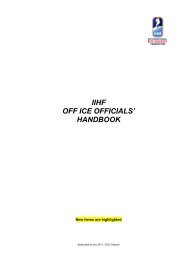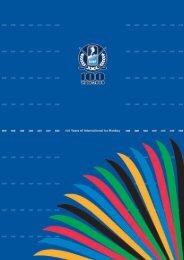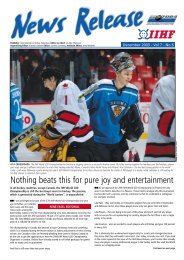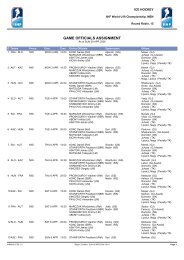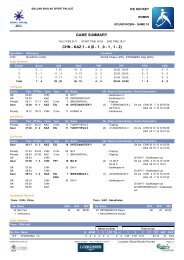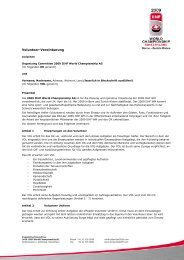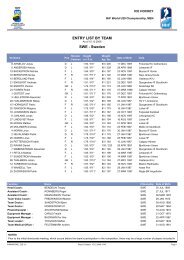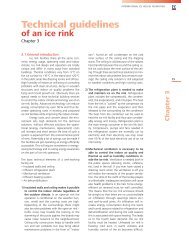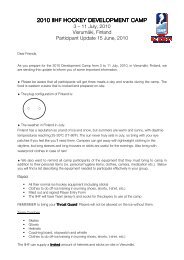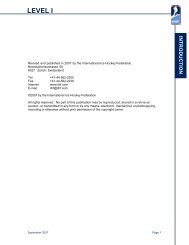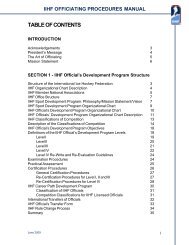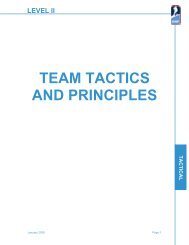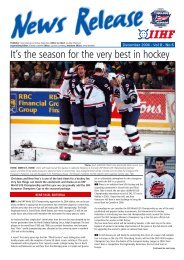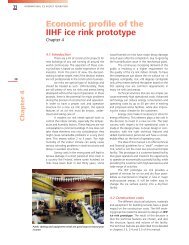Finland Head Coach Jukka Jalonen - IIHF
Finland Head Coach Jukka Jalonen - IIHF
Finland Head Coach Jukka Jalonen - IIHF
You also want an ePaper? Increase the reach of your titles
YUMPU automatically turns print PDFs into web optimized ePapers that Google loves.
6<br />
INTERNATIONAL ICE HOCKEY FEDERATION<br />
President’s Report<br />
A season of unity and progress<br />
2011 campaign among most productive in <strong>IIHF</strong> history<br />
T<br />
hey say that a post-Olympic season can be<br />
somewhat of a “hangover”. Let me inform all <strong>IIHF</strong><br />
members, stakeholders, partners and friends that it has<br />
been anything but. The 2010-2011 season has been<br />
one of the most successful and productive in the history<br />
of the <strong>IIHF</strong>.<br />
Even before the first puck was dropped, the global<br />
hockey community gathered at the Molson Canadian<br />
World Hockey Summit in Toronto, Canada. It was not<br />
only a four-day meeting, but the beginning of an era<br />
of better understanding between ice hockey’s major<br />
organizations.<br />
It is not very often the hockey world gets together like<br />
this. The last time an international summit was held<br />
was 16 years earlier in Boston. Now in Toronto, following<br />
the unprecedented success of Vancouver 2010, it<br />
was an excellent opportunity for the <strong>IIHF</strong>, NHL, NHLPA,<br />
Hockey Canada, USA Hockey and the Canadian Hockey<br />
League to put together this four-day event to discuss<br />
the most pressing issues our game faces today.<br />
The summit featured some excellent presentations and<br />
insightful key-note speeches. The best and most committed<br />
hockey people in the world were there. Afterwards,<br />
I was convinced that only good things will come<br />
out of this. For certain results we will have to wait a little<br />
longer, but on other issues we saw immediate impact.<br />
Hayley Wickenheiser had barely ended her speech before<br />
the <strong>IIHF</strong>, during the very same topic session, announced<br />
a two-million Swiss Franc contribution to the<br />
development of the women’s game. And at the Semi-<br />
Annual Congress one month later a four-year women’s<br />
hockey development plan was presented to our constituency.<br />
The employment of Tanya Foley, the <strong>IIHF</strong> first Women’s<br />
Development Program Manager, and the ensuing<br />
Women’s Ambassador and Mentor Program involving<br />
13 countries were direct results of the summit. A caveat:<br />
Development takes time. Don’t count on any revolutionary<br />
shifts in power come Sochi 2014. This is a long-term<br />
plan that goes beyond the next Olympics. But we should<br />
see much better equality in the women’s game for 2018<br />
and definitely 2022.<br />
A post-Olympic year is also traditionally the period<br />
when some changes are made. The Semi-Annual Con-<br />
gress in Portoroz, Slovenia approved a format change<br />
for the top division of the <strong>IIHF</strong> World Championship,<br />
as of 2012. The <strong>IIHF</strong>’s first format change in a decade<br />
will eliminate the qualifying (second) round as the traditional<br />
four groups of four will now become two groups<br />
of eight.<br />
Apart from an increase in games (from 56 to 64), the<br />
biggest change is that the entire preliminary round<br />
schedule will be known to fans and organizers beforehand,<br />
which should of course be good for ticket sales.<br />
It will be very exciting to see how this will work out for<br />
<strong>Finland</strong> 2012 and Sweden 2013.<br />
The 35th <strong>IIHF</strong> World U20 Championship in Buffalo and<br />
Niagara took this remarkable event to yet another level.<br />
USA Hockey and the host organizers sold 329,687 tickets<br />
for the 31 games, making the 2011 U20s the bestattended<br />
<strong>IIHF</strong> event in United States history.<br />
Not only did the 2011 World Juniors solidly surpass the<br />
previous best U20 event in the U.S. (the 2005 event in<br />
Grand Forks with a total attendance of 193,256) but it<br />
also drew more spectators than the men’s tournament<br />
at the 2002 Olympics in Salt Lake City, which attracted<br />
268,139 fans for 35 games.<br />
But the question is, which is more amazing? The record<br />
in the arenas or the one produced before the TV sets in<br />
Canada? An incredible 14.2 million Canadians watched<br />
some or all of the gold medal game between Canada<br />
and Russia. In a country of 33 million, that represents<br />
nearly half the population. Viewership peaked at 9.3<br />
million late in the third period. The game was the most<br />
watched show on Canadian television since the 2010<br />
Olympics in Vancouver ten months earlier.<br />
The event in Buffalo also underlined the <strong>IIHF</strong>’s uncompromising<br />
position on its policy that there is “no such<br />
thing as a clean hit to the head”. Five players received<br />
supplementary suspensions of ten games in total. As<br />
much as the <strong>IIHF</strong> would like to avoid suspending players,<br />
especially at the youth level, the international hockey<br />
community is united when it comes to this infraction.<br />
And the <strong>IIHF</strong> is extremely confident with its position.<br />
There are no “ifs” or “buts”, no east-west, north-south<br />
or “blindside”. If the most vital part of your body is targeted,<br />
you are out of the game. Hits to the head must<br />
be taken out and this is a necessary education process<br />
that we are going through.



